
Elvis Aaron Presley was an American singer and actor. Dubbed the "King of Rock and Roll", he is regarded as one of the most significant cultural icons of the 20th century. His energized interpretations of songs and sexually provocative performance style, combined with a singularly potent mix of influences across color lines during a transformative era in race relations, led him to both great success and initial controversy.

"Heartbreak Hotel" is a song recorded by American singer Elvis Presley. It was released as a single on January 27, 1956, Presley's first on his new record label RCA Victor. It was written by Tommy Durden and Mae Boren Axton, with credit being given also to Presley.

"Something" is a song by the English rock band the Beatles from their 1969 album Abbey Road. It was written by George Harrison, the band's lead guitarist. Together with his second contribution to Abbey Road, "Here Comes the Sun", it is widely viewed by music historians as having marked Harrison's ascendancy as a composer to the level of the Beatles' principal songwriters, John Lennon and Paul McCartney. Two weeks after the album's release, the song was issued on a double A-side single, coupled with "Come Together", making it the first Harrison composition to become a Beatles A-side. The pairing was also the first time in the United Kingdom that the Beatles issued a single containing tracks already available on an album. While the single's commercial performance was lessened by this, it topped the Billboard Hot 100 in the United States as well as charts in Australia, Canada, New Zealand and West Germany, and peaked at number 4 in the UK.

Sun Studio is a recording studio opened by rock-and-roll pioneer Sam Phillips at 706 Union Avenue in Memphis, Tennessee, on January 3, 1950. It was originally called Memphis Recording Service, sharing the same building with the Sun Records label business. Reputedly the first rock and roll single, Jackie Brenston and his Delta Cats' "Rocket 88" was recorded there in 1951 with song composer Ike Turner on keyboards, leading the studio to claim status as the birthplace of rock & roll. Blues and R&B artists like Howlin' Wolf, Junior Parker, Little Milton, B.B. King, James Cotton, Rufus Thomas, and Rosco Gordon recorded there in the early 1950s.

The discography of English singer-songwriter and ex-Beatle George Harrison consists of 12 studio albums, two live albums, four compilation albums, 35 singles, two video albums and four box sets. Harrison's first solo releases – the Wonderwall Music film soundtrack (1968) and Electronic Sound (1969) – were almost entirely instrumental works, issued during the last two years of the Beatles' career. Following the band's break-up in April 1970, Harrison continued to produce recordings by his fellow Apple Records acts, notably former bandmate Ringo Starr. He recorded and collaborated with a wide range of artists, including Shankar, Bob Dylan, Eric Clapton and Gary Wright.
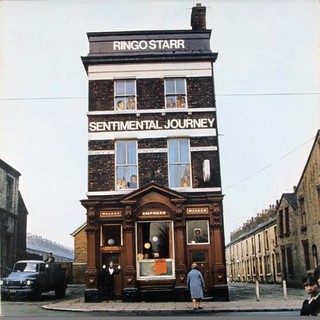
Sentimental Journey is the debut solo album by English rock musician Ringo Starr. It was released by Apple Records in March 1970 as the Beatles were breaking up. The album is a collection of pre-rock 'n' roll standards that Starr recalled from his childhood in Liverpool. As a departure from the experimental quality that had characterised solo LPs by George Harrison and John Lennon since 1968, it was the first studio album by an individual Beatle to embrace a popular music form.

John Richard Lomax was an English guitarist and singer-songwriter. He is best known for his association with George Harrison, who produced Lomax's recordings for the Beatles' Apple record label in the late 1960s.

Encouraging Words is the fifth studio album by American soul musician Billy Preston, released in September 1970 on Apple Records. It was the last of Preston's two albums for the Beatles' Apple label, after which he moved to A&M Records. The album was co-produced by George Harrison and Preston. Harrison's songs "All Things Must Pass" and "My Sweet Lord" were issued here for the first time, two months before his own recordings appeared on his triple album All Things Must Pass.
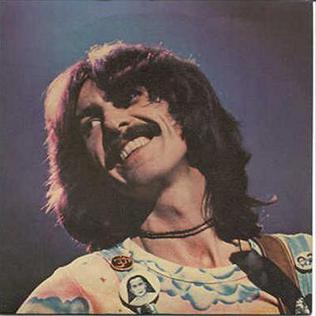
"You" is a song by English musician George Harrison, released as the opening track of his 1975 album Extra Texture . It was also the album's lead single, becoming a top 20 hit in America and reaching number 9 in Canada. A 45-second instrumental portion of the song, titled "A Bit More of You", appears on Extra Texture also, opening side two of the original LP format. Harrison wrote "You" in 1970 as a song for Ronnie Spector, formerly of the Ronettes, and wife of Harrison's All Things Must Pass co-producer Phil Spector. The composition reflects Harrison's admiration for 1960s American soul/R&B, particularly Motown.
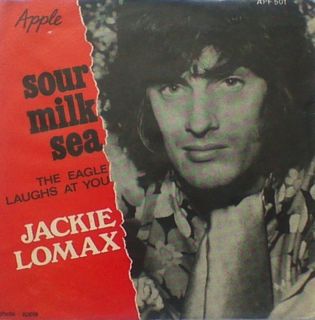
"Sour Milk Sea" is a song by English rock singer Jackie Lomax that was released as his debut single on the Beatles' Apple record label in August 1968. It was written by George Harrison during the Beatles' stay in Rishikesh, India, and given to Lomax to help launch Apple Records. The recording is a rarity among non-Beatles songs since it features three members of the band – Harrison, who also produced the track, Ringo Starr and Paul McCartney. Performed in the hard rock style, the song also includes musical contributions from Eric Clapton and session pianist Nicky Hopkins, and was the first of many Harrison productions for artists signed to the Beatles' record label.
"That Is All" is a song by English musician George Harrison released as the final track of his 1973 album Living in the Material World. A slow, heavily orchestrated ballad, it is one of many Harrison love songs that appear to be directed at either a woman or a deity. Harrison wrote and recorded the song during the height of his public devotion to Hinduism; on release, Rolling Stone described its lyrics as "a sort of Hindu In Paradisium".
John Barham is an English classical pianist, composer, arranger, producer and educator. He is best known for his orchestration of George Harrison albums such as All Things Must Pass (1970) and for his association with Indian sitar maestro Ravi Shankar. Barham trained at the Royal College of Music and the School of Oriental and African Studies in London, before establishing himself during the mid 1960s as a composer of piano interpretations of Indian classical ragas. He became a student of Shankar, for whose East–West collaborations with Yehudi Menuhin and others he transcribed Indian melodies into Western musical annotation. Through Shankar, Barham began a long friendship with Harrison in 1966, then a member of the Beatles, which assisted Harrison's own education in Indian music as well as his promotion of the genre to Western audiences. Barham collaborated with Harrison on the latter's Wonderwall Music soundtrack album (1968), before providing the orchestral arrangements for All Things Must Pass songs such as "Isn't It a Pity" and "My Sweet Lord", and for Harrison's 1973 album Living in the Material World.
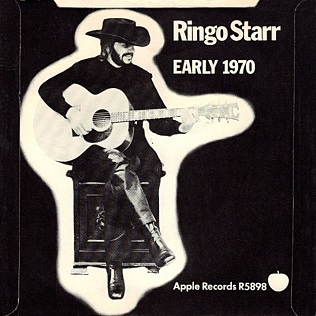
"Early 1970" is a song by English rock musician Ringo Starr that was released as the B-side of his April 1971 single "It Don't Come Easy". A rare example of Starr's songwriting at the time, it was inspired by the break-up of the Beatles and documents his relationship with his three former bandmates. The lyrics to the verses comment in turn on Paul McCartney, John Lennon and George Harrison as individuals, and the likelihood of each of them making music with Starr again. In the final verse, Starr offers a self-deprecating picture of his musical abilities and expresses the hope that all four will play together in the future. Commentators have variously described "Early 1970" as "a rough draft of a peace treaty" and "a disarming open letter" from Starr to Lennon, McCartney and Harrison.
"You and Me (Babe)" is a song by English musician Ringo Starr, released as the final track on his 1973 album Ringo. Starr's fellow ex-Beatle George Harrison wrote the song along with Mal Evans, the Beatles' longtime aide and a personal assistant to Starr during the making of Ringo. The track serves as a farewell from Starr to his audience in the manner of a show-closing finale, by lyrically referring to the completion of the album. During the extended fadeout, Starr delivers a spoken message in which he thanks the musicians and studio personnel who helped with the recording of Ringo – among them, Harrison, John Lennon and Paul McCartney, and his producer, Richard Perry.
Lon & Derrek Van Eaton were an American vocal and multi-instrumentalist duo from Trenton, New Jersey, consisting of brothers Lon and Derrek Van Eaton. They are best known for their association with the Beatles through the brothers' brief stint on Apple Records, and for their subsequent session work in Los Angeles for producer Richard Perry. As well as recording their own albums, during the 1970s they appeared on releases by artists including George Harrison, Ringo Starr, Harry Nilsson, Carly Simon, Martha Reeves and Art Garfunkel. Beatles biographer Robert Rodriguez describes the Van Eaton brothers as arguably the closest the Apple record label came to delivering on its initial promise of "plucking unknowns from obscurity" and launching them as successful recording artists.

"Apple Scruffs" is a song by English rock musician George Harrison from his 1970 triple album All Things Must Pass. He wrote it as a tribute to the die-hard Beatles fans known as Apple scruffs, who used to wait outside the Apple Corps building and other London locations for a glimpse of the band members. This tradition continued after the group's break-up in April 1970, as the scruffs were a regular presence outside the studios where Harrison recorded his album. The song was also issued on the album's second single, as the B-side to "What Is Life".
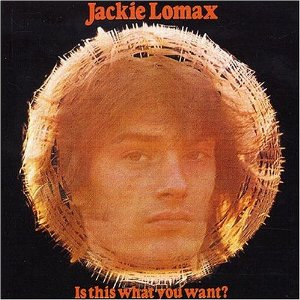
Is This What You Want? is the debut album by English rock and soul singer Jackie Lomax, released in 1969 on the Beatles' Apple record label. It is notable for the involvement of three Beatles: It was produced by George Harrison and features contributions from Harrison, Paul McCartney and Ringo Starr. The album includes Lomax's debut single for Apple, the Harrison-written "Sour Milk Sea", while the US version added "New Day", which was produced by Lomax and released as a non-album single in Britain.

Doris Troy is an album released in 1970 on the Beatles' Apple Records label by American soul singer Doris Troy. It features songs written by Troy and a number of the participants on the sessions, including George Harrison, Stephen Stills, Klaus Voormann and Ringo Starr. Through the extended period of recording, the album became an all-star collaborative effort, typical of many Apple projects during 1968–70, although it was Troy's only album on the Beatles' label. Other guest musicians included Billy Preston, Peter Frampton, Leon Russell, Eric Clapton and members of the Delaney & Bonnie Friends band. Like the Harrison-produced single "Ain't That Cute", Doris Troy failed to chart in Britain or America on release.

The Radha Krsna Temple is a 1971 album of Hindu devotional songs recorded by the UK branch of the Hare Krishna movement – more formally, the International Society for Krishna Consciousness (ISKCON) – who received the artist credit of "Radha Krishna Temple (London)". The album was produced by George Harrison and released on the Beatles' Apple record label. It compiles two hit singles, "Hare Krishna Mantra" and "Govinda", with other Sanskrit-worded mantras and prayers that the Temple devotees recorded with Harrison from July 1969 onwards.

Brother is the debut album by the American pop-rock duo Lon & Derrek Van Eaton. It was released on the Beatles' Apple record label in September 1972 in the United States and February 1973 in Britain. It includes the single "Sweet Music", produced by George Harrison, and was otherwise produced by Klaus Voormann, a friend and longtime associate of the Beatles. On release, the album received favorable reviews from music critics but failed to achieve commercial success. Rolling Stone critic Stephen Holden hailed it as a "staggeringly impressive first album".
















